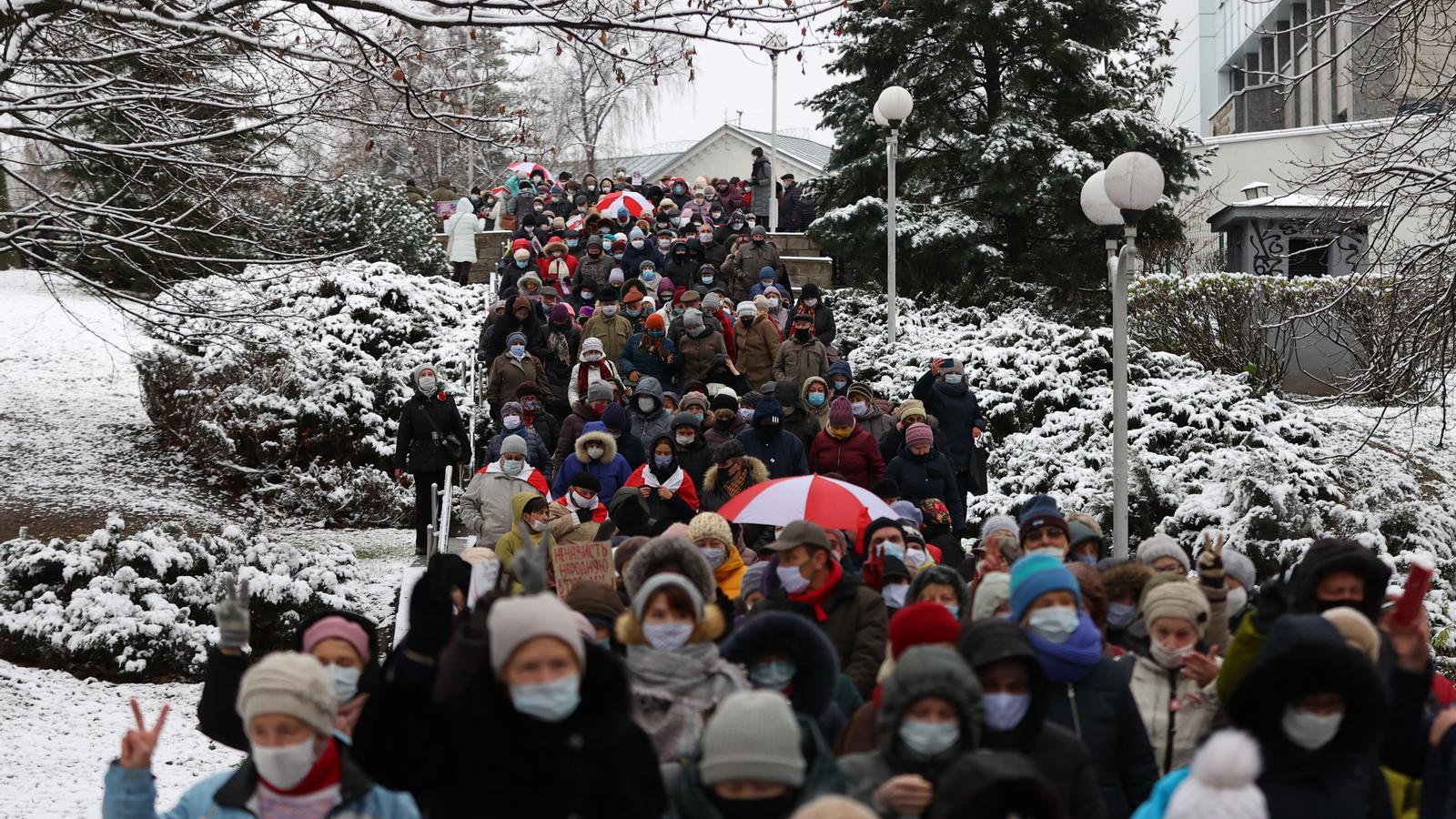The opposition is bleeding to death in Putin's puppet country
The opposition movement in Belarus, based in Lithuania, is losing ground in its appeal to young people as Lukashenko consolidates his seventh consecutive term.

MinskA huge statue of Lenin reigns supreme in Minsk's Independence Square, guarding the entrance to Government House, a Soviet-era building with hundreds of rectangular windows from which the Republic of Belarus is controlled. Two or three people walk in front of it, some Russian tourists take a few photos, but apart from the soldiers guarding the building, there is not much movement in the square.
Five years ago, the situation was very different. In May 2020, and continuing into March 2021, hundreds of thousands of people took to the streets of the capital and invaded this very square with white and red flags and cries of freedom. They were protesting against the authoritarian and repressive regime of Aleksandr Lukashenko, who that year won his sixth election unopposed. The state responded to the demonstrations with firearms and harsh sentences in prisons and penal colonies, which caused a mass exile.
The so-called Anti-Panerola Revolution has been violently eliminated from the streets of Belarus. In 2025, after the President Lukashenko's seventh uncontested victoryThere's no trace of unrest on the streets of the capital. Currently, activists are meeting secretly and in small groups. Five years after Belarus raised its voice against its president, absolutely nothing has changed in the country. Any political activity outside the regime is dangerous for the person involved, as well as for their entire family and acquaintances.
Olga Tsessakova, who was a councilor at Minsk City Council from 2018 to 2024 and now lives in exile in Poland, tries to avoid the disconnect between Belarusian activists and the democratic movement in exile based in Lithuania. "Today, what matters to many," explains Tsessakova, "is no longer political statements made in front of a microphone, but the feeling that they are not alone, that others around them share their values and hopes."
The wear and tear of the opposition
In contrast to the reality in Belarus, the diaspora and activists in exile enjoy full freedoms, with access to international platforms and no fear of meeting openly. "Come and we will discuss our ideas and concerns," said opposition leader Svetlana Tikhanovskaya in a video inviting people to participate in a conference in Warsaw.
In Vilnius, the United Transitional Cabinet led by Tikhanovskaya aims to be an executive body and an international representative of the country. The exiled Belarusian democrats remain active, but carry out symbolic and abstract work, with no real impact within Belarus. The regime is becoming increasingly armored, repressive and violent, and protects itself from any movement originating in the European Union.
This June, Tikhanovskaya's husband, Sergei Tikhanovskaya, was released after five years in prison, in very poor physical condition, and denounces extreme violence. More than 1,300 victims of reprisals remain behind bars across the country, including opposition members, activists, journalists, and protesters. Some have died from ill-treatment, torture, and denial of medical care. Meanwhile, arrests continue to increase, and the number of rigged trials and people imprisoned continues to rise.
"Declarations, strategies, and doctrines have become stuck in 2020," Tsessakova analyzes, "and internal changes in Belarus require new approaches." For many, symbolic actions, videos, and strategies on paper are no longer enough, and promises are beginning to lose their magic. "People don't want to sacrifice in exchange for symbolic gestures," she says.
Criticism of the cabinet is beginning to gain traction, especially because it was not elected. It functions more as an organization, but presents itself as a political body. The diaspora and members of the most politically active circles are increasingly wary of the lack of democratic processes within the cabinet itself. For some, there is a lack of self-criticism and analysis of the authoritarian aspects inherited from the Belarusian political culture in which all participants in the democratic movement have grown up.
The new dream: a gradual transition to democracy
Young people, above all, are calling for diversification both in the way the message is spread and in the message itself. Big numbers and grand declarations don't reflect the reality in Belarus. Behind every number is a person who might believe in change and revolution, but perhaps believes that the Lukashenko regime is democratic and that foreign forces from the West simply want to ruin the country, just like the domestic media. And this won't be solved just with Instagram videos made by those already convinced, demonstrations in squares where freedom of expression is guaranteed, or conferences that Belarusians themselves cannot attend and return home safely.
The future of the Belarusian democratic movement is uncertain. Today, victory lacks a clear shape. In 2020, it was obvious: the fall of the Lukashenko regime, free elections, and the romantic notion of the victory of justice. It was a deeply emotional, not just political, goal, necessary to drive all those people to rebel, despite knowing the dangers it entailed and ignoring the systemic problems and the lack of real strategies.
Today, the dream is a gradual transition, one that involves not only a change in government, but also the building of a strong civil society, solid institutions with a separation of powers, and education based on respect for human rights. "Victory will be complete when people stop being afraid, and when you don't have to be a hero to be a citizen," says Tsessakova, hopeful, and, like her, thousands of Belarusians inside and outside the borders of a country that dreams of freedom.
